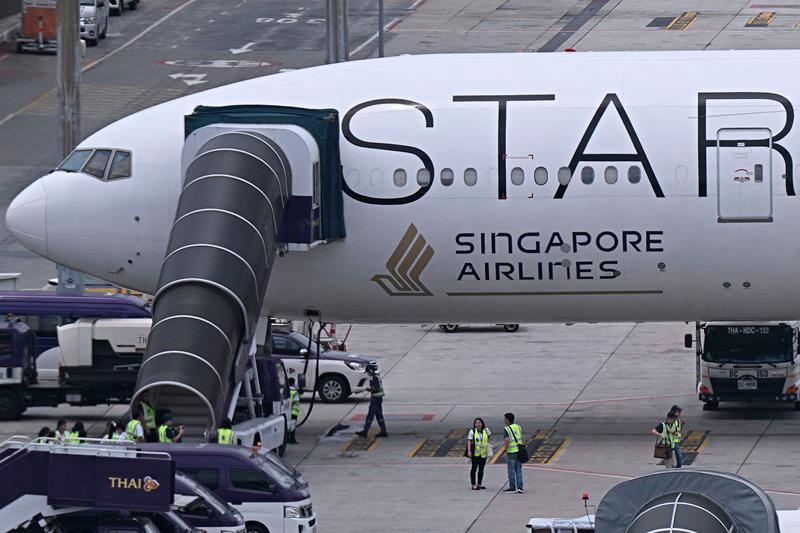Singapore: Singaporean investigators are analysing a cockpit voice recorder and a flight data recorder after one passenger died and more than 100 were injured when a Singapore Airlines plane hit severe turbulence this week, the country’s transport minister said on Friday.
Passengers and crew aboard flight SQ321 suffered skull, brain and spine injuries when they were thrown violently around the cabin during Tuesday’s terrifying high-altitude ordeal.
The London-to-Singapore flight carrying 211 passengers and 18 crew was forced to make an emergency landing in Bangkok, where at least 48 people are still being treated in hospital.
Flight tracking data shows the Boeing 777-300ER plunged 1,800 metres (6,000 feet) in just a few minutes, with passengers saying it happened so suddenly there was no time for many to fasten their seatbelts.
“We have a team that went to Bangkok and they have obtained the data from the cockpit voice recorder and flight data recorder,“ Singapore’s Transport Minister Chee Hong Tat said in a statement.
“They are going through the data from these two recorders now to be able to ascertain what happened during those moments. So, we await investigation findings to understand what happened during that time.”
Singapore Airlines said earlier on Friday it has tightened seatbelt rules on its flights after the incident and that it has introduced a “more cautious approach” to turbulence.
“In addition to the suspension of hot beverage service when the seat belt sign is on, the meal service will also be suspended,“ it said in a statement to AFP.
“SIA will continue to review our processes as the safety of our passengers and crew is of utmost importance.”
Investigators from the United States have also travelled to Thailand to investigate the cause of the incident.
Air safety experts have told AFP that passengers are often too casual about wearing seatbelts, leaving them at risk if the plane hits unexpected turbulence.
Scientists also warn that so-called clear air turbulence, which is invisible to radar, is getting worse because of climate change.
‘Absolute carnage’
The director of Bangkok’s Samitivej Srinakarin hospital, where most of the injured have been treated, said his staff had never treated such severe injuries caused by turbulence.
Australian passenger Keith Davis described the ordeal, which left his wife Kerry with a severe spinal injury and no feeling below the waist.
“It was absolute carnage, instantly. It was absolutely surreal. You know, there’s no warning,“ he told Australian broadcaster Channel 9.
“Before we knew it we were on the ceiling. And then bang, we’re on the ground. And you don’t know what is going on. And you’ve literally fallen 6,000 feet (1,829 metres).”
Davis said his wife hit the doors of the overhead luggage lockers before falling to the floor of the aisle and was unable to move for the rest of the flight.
The plane was met at Bangkok’s Suvarnabhumi Airport by emergency responders who used gurneys to ferry the injured to ambulances waiting on the tarmac.
Photos taken inside the plane after it landed in Bangkok show the cabin in chaos, strewn with food, drinks and luggage, and with oxygen masks dangling from the ceiling.
Singapore Airlines chief executive Goh Choon Phong has apologised for the “traumatic experience” and expressed condolences to the family of the deceased -- a 73-year-old British man.









